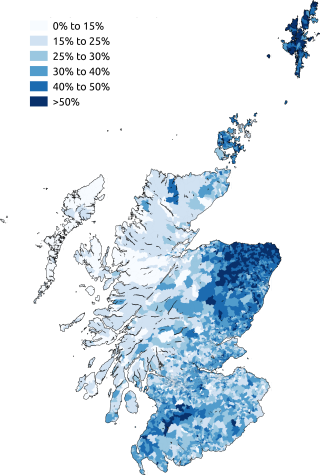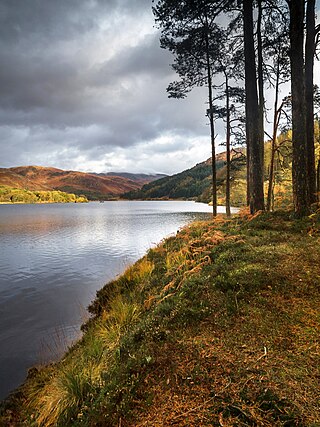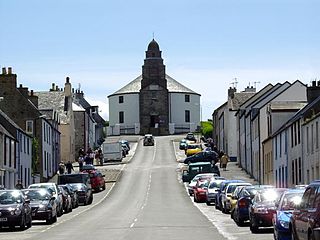Related Research Articles

Scotland is a country that is part of the United Kingdom. It contains nearly one-third of the United Kingdom's land area, consisting of the northern part of the island of Great Britain and more than 790 adjacent islands, principally in the archipelagos of the Hebrides and the Northern Isles. To the south-east, Scotland has its only land border, which is 96 miles (154 km) long and shared with England; the country is surrounded by the Atlantic Ocean to the north and west, the North Sea to the north-east and east, and the Irish Sea to the south. The population in 2022 was 5,439,842. Edinburgh is the capital and Glasgow is the most populous of the cities of Scotland.

John Balliol or John de Balliol, known derisively as Toom Tabard, was King of Scots from 1292 to 1296. Little is known of his early life. After the death of Margaret, Maid of Norway, Scotland entered an interregnum during which several competitors for the Crown of Scotland put forward claims. Balliol was chosen from among them as the new King of Scotland by a group of selected noblemen headed by King Edward I of England.

Scots is a language variety descended from Early Middle English in the West Germanic language family. Most commonly spoken in the Scottish Lowlands, the Northern Isles of Scotland, and northern Ulster in Ireland, it is sometimes called: Lowland Scots, to distinguish it from Scottish Gaelic, the Celtic language that was historically restricted to most of the Scottish Highlands, the Hebrides, and Galloway after the sixteenth century; or Broad Scots, to distinguish it from Scottish Standard English. Modern Scots is a sister language of Modern English, as the two diverged from the same medieval form of English.

Galloway is a region in southwestern Scotland comprising the historic counties of Wigtownshire and Kirkcudbrightshire. It is administered as part of the council area of Dumfries and Galloway.

Jedburgh is a town and former royal burgh in the Scottish Borders and the traditional county town of the historic county of Roxburghshire.

Fiona Margaret Mactaggart is a British politician and former primary school teacher who has been chair of the Fawcett Society since 2018. A member of the Labour Party, she was Member of Parliament (MP) for Slough from 1997 to 2017.

Dalbeattie (, Scots: Dawbeattie, Scottish Gaelic: Dail Bheithe meaning 'haugh of the birch', or Dail Bhàite 'drowned haugh' is a town in the historical county of Kirkcudbrightshire in Dumfries and Galloway, Scotland. Dalbeattie is in a wooded valley on the Urr Water 4 miles east of Castle Douglas and 12 miles south west of Dumfries.

Bowmore is a small town on the Scottish island of Islay, situated on the banks of the sea loch, Loch Indaal. It serves as administrative capital of the island, and gives its name to the noted Bowmore distillery producing Bowmore single malt scotch whisky.

Fergus of Galloway was a twelfth-century Lord of Galloway. Although his familial origins are unknown, it is possible that he was of Norse-Gaelic ancestry. Fergus first appears on record in 1136, when he witnessed a charter of David I, King of Scotland. There is considerable evidence indicating that Fergus was married to an illegitimate daughter of Henry I, King of England. It is possible that Elizabeth Fitzroy was the mother of Fergus's three children.
Catch the ten, also called Scots whist or Scotch whist, is an 18th-century point-trick ace–ten card game that is recorded as being played only in Scotland, although evidence suggests a possible German origin. Unlike standard whist, it is played with a pack of only 36 cards, the fives and below being omitted. In the trump suit, the jack is the highest card. Despite its alternative name, it has nothing to do with standard whist.

Birkie or Birky is an historical Scottish west coast card game for two players that is first recorded by Sir Walter Scott in 1819. It has been equated to Beggar my Neighbour, however, its rules are different.

Clan Muir is a Scottish clan that is armigerous. Per certain sources, holders of the surname Muir, of Ayrshire, have been noted as a possible sept of Clan Boyd, though this is not clearly identified to a reliable resource. A spelling variation More/Moore is a sept of Clan Leslie in Aberdeenshire, and, having genetic proof of Muirs in Aberdeenshire, may have roots in the Mure/Muir line of southwest Scotland.
Rev George Jardine FRSE was a Scottish minister of religion, philosopher, academic and educator. He was Professor at the University of Glasgow, of Greek from 1774, and then Professor of Logic and Rhetoric 1787 to 1824. He was a co-founder of the Royal Society of Edinburgh in 1783 and co-founder of Glasgow Royal Infirmary in 1792.
Hugh McMillan is a Scottish poet and short story writer.

Black Morrow, also known as Black Murray and Outlaw Murray, is the name given to a late 15th century Scottish outlaw. A popular ballad makes the bandit as living in Ettrick Forest, while a recorded oral tradition, a wood in Kirkcudbrightshire. In the tradition, the outlaw is described as a Romani or Scottish Traveller, Moor, a Saracen or, more commonly, an Irishman or from Ireland. The folklorist David MacRitchie took a strong interest in the ethnicity of the outlaw because of his dark skin, and the story is commonly quoted in modern Afrocentrist literature. Others however have disputed whether the bandit was dark skinned, or a "Blackimore".

John o' Groats is a village 2.5 mi (4 km) north-east of Canisbay, in the historic county of Caithness, Scotland. It lies on Scotland's north-eastern tip and is popular with tourists. The northernmost point of mainland Scotland is nearby Dunnet Head and the north eastern corner is nearby Duncansby Head.

The Scottish people or Scots are an ethnic group and nation native to Scotland. Historically, they emerged in the early Middle Ages from an amalgamation of two Celtic peoples, the Picts and Gaels, who founded the Kingdom of Scotland in the 9th century. In the following two centuries, Celtic-speaking Cumbrians of Strathclyde and Germanic-speaking Angles of Northumbria became part of Scotland. In the High Middle Ages, during the 12th-century Davidian Revolution, small numbers of Norman nobles migrated to the Lowlands. In the 13th century, the Norse-Gaels of the Western Isles became part of Scotland, followed by the Norse of the Northern Isles in the 15th century.
The Battle of the River Dee or the Battle of the River Cree, was fought on 29 June 1308 during the Scottish Wars of Independence near Buittle, on the banks of the River Dee or River Cree, Galloway, Scotland.
Robert Service (1854–1911) was a British nurseryman and naturalist.
John Mactaggart was a Scottish writer and engineer born near Plunton Castle in the parish of Borgue. He is best known for writing The Scottish Gallovidian Encyclopedia, a wide-ranging and idiosyncratic reference work covering local words, places, traditions, and songs collected in and around Galloway.
References
- ↑ McLure, J Derrick (2004). "A LOCAL TREASURE-TROVE: John Mactaggart's Scottish Gallovidian Encyclopedia" (PDF). Transactions of the Dumfriesshire and Galloway Natural History and Antiquarian Society. Third Series. LXXVIII: 131–138. Archived from the original (PDF) on 2 July 2023.
- ↑ "Results of Advanced Search for "gallov encycl"". Dictionaries of the Scots Language | Dictionars o the Scots Leid. 2 July 2023. Retrieved 2 July 2023.